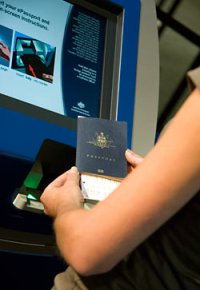E-passport fraud no threat to SmartGate

The Australian Customs Service today said its inbound e-passport authentication system SmartGate would not be fooled by fake details, after a Dutch hacker claimed to have broken through similar systems in Europe.

SmartGate kiosk
(Credit: Customs)
A Dutch hacker has claimed that tampered-with e-passports could pass by Holland's airport authentication system without detection. The hacker substituted his own details with the bogus identity of Elvis Presley, and claimed the passport went undetected during authentication.
The problem, according to critics of the International Civil Aviation Organisation's authentication processes, lies in its e-passport standard.
The standard does not restrict which countries create and sign passport data, according to the critic, meaning that for example, China or India could create Australian passport data and sign it with an Australian key.
However, the SmartGate system uses biometric scanning to cross-check a person's face with the details stored within the e-passport, said a Customs spokesperson responsible for implementing SmartGate, adding that its system would not be exposed to fraud. SmartGate is currently installed at Brisbane and Cairns and was added last month at Melbourne.
"If there was a fraudulent e-passport, SmartGate would definitely pick that up because it would show that it hadn't come from an authentic authority," the spokesperson told ZDNet.com.au. "The Department of Foreign Affairs and Trade decides what certificates it accepts, which is what SmartGate relies on."
The spokesperson said Customs was "happy" with the accuracy of the biometric system used in SmartGate, but declined to divulge exact details about its accuracy because the system related to border security.
While e-passports, which started being issued in 2005, were claimed by DFAT to be the most secure passports ever, the SmartGate initiative is primarily about efficiency, said the spokesperson. The aim was to cut the number of staff required for processing incoming citizens, they said.
At present, Australia's e-passport authentication system is only open to Australians and New Zealanders travelling to Australia. The system is expected to be rolled out nationally by June 2009.
The spokeperson said that 5,000 people had passed through Melbourne airport's SmartGate check points, and that feedback from users had been positive so far. Customs plans to conduct more thorough research into how people respond to the system in November this year.